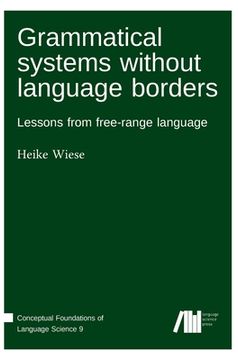Share
Grammatical systems without language borders (in English)
Heike Wiese
(Author)
·
Language Science Press
· Hardcover
Grammatical systems without language borders (in English) - Wiese, Heike
$ 28.00
$ 35.00
You save: $ 7.00
Choose the list to add your product or create one New List
✓ Product added successfully to the Wishlist.
Go to My WishlistsIt will be shipped from our warehouse between
Wednesday, July 10 and
Thursday, July 11.
You will receive it anywhere in United States between 1 and 3 business days after shipment.
Synopsis "Grammatical systems without language borders (in English)"
Current research in grammatical analysis and sociolinguistics points to two core characteristics of language that seem incommensurable at first sight: (1) research on linguistic structure indicates internal organisation and coherence, and the workings and interactions of distinct grammatical systems, but (2) sociolinguistic research suggests that language borders and bound "languages" are counterfactual social constructs that cannot capture the diversity and fluidity of actual language use. This seems to constitute something like a "quantum-linguistic" paradox: language systems aren't real (they are just ideological constructions), but at the same time, they are a reflection of actual structure. This book shows how this paradox can be resolved through an architecture that allows for grammatical systems without presupposing language borders: this architecture puts communicative situations, rather than languages, at the core of linguistic systematicity, while named languages are captured as optional sociolinguistic indices. The approach builds on insights from "free-range" language, a metaphor for language in settings that are less confined by monoglossic ideologies. The author looks at four different kinds of settings: urban markets, heritage language settings, multiethnic adolescent peer-groups, and digital social media. Central lessons to be learned from such free-range language settings are: (1) communicative situations support linguistic differentiation and can thus be the basis for fluid registers; (2) grammatical systematicity is grounded in communicative situations and does not require bound languages and linguistic borders; (3) named "languages" can emerge as social indices signalling belonging, but this is an optional, not a necessary development.
- 0% (0)
- 0% (0)
- 0% (0)
- 0% (0)
- 0% (0)
All books in our catalog are Original.
The book is written in English.
The binding of this edition is Hardcover.
✓ Producto agregado correctamente al carro, Ir a Pagar.

